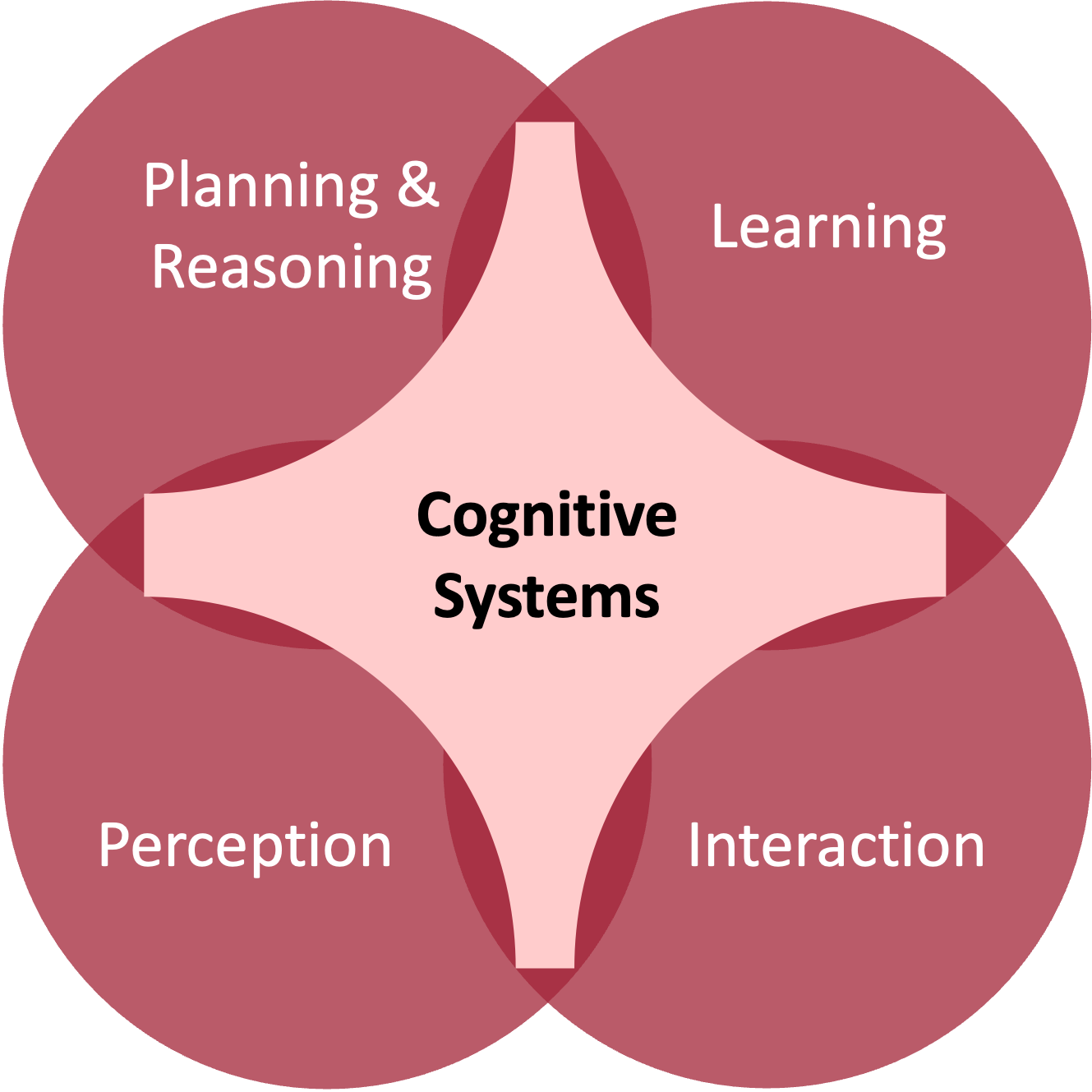Application
For Current Students
About Cognitive Systems
Cognition involves processing and analyzing information to control behavior, encompassing perceptual processes, mental functions, and actions, whether conscious or unconscious. Human cognition allows flexible reactions to the environment, creative problem-solving, and knowledge acquisition through learning, reasoning, and planning. Systems providing such cognitive abilities are called cognitive systems, and when implemented as technology, they are known as cognitive technical systems.
Studying cognitive systems is interdisciplinary, involving computer science (especially AI and neural information processing), physics, engineering, psychology, biology, neuroscience, and clinical sciences like psychiatry. Philosophy also contributes by critically examining the assumptions and ethical implications of cognitive research.
To function effectively, cognitive systems must integrate perception, learning, memory, decision-making, reasoning, and interaction capabilities.
Ulm University's MSc course "Cognitive Systems" covers the theoretical and empirical foundations of these abilities. It develops models to investigate and evaluate cognitive mechanisms in both biological and technical systems. These insights support applications like intelligent robots, vehicles, devices, and smart cities, aiming to enhance human performance.

Career Opportunities
This course prepares graduates for careers in scientific research and industry, where human-technology interaction is key. Cognitive systems play a central role in intelligent systems development and human-machine interaction, especially in fields like automotive technology, medical devices, and high-tech industries. Career paths include research and development in areas such as cognitive ergonomics, multimedia, e-learning, interface design, and prosthetics. Graduates may work on tasks like hardware and software development, usability improvements, or market-driven solutions. Cognitive Systems combines cognitive science, computation, and intelligent systems design.
Unlike degrees in Computer Science, Media Informatics, or Psychology, Cognitive Systems focuses on empirical and functional analysis of cognitive processes. These include sensory processing, planning, decision-making, and motor performance like navigation and manipulation. Key areas of study involve learning processes and memory control, both critical to cognitive systems development.
Graduates with interdisciplinary expertise in psychology and computer science are in high demand, especially in automotive technologies, where cognitive functions are crucial for self-driving cars. Many companies in and around Ulm, including those in automotive, sensor, and intelligence technology, offer job opportunities. Cognitive ergonomics, interface design, and usability are also important in local enterprises involved in transport, engineering, and speech recognition.
MSc graduates in Cognitive Systems are well-prepared for academic careers, including doctoral research in life sciences, neurosciences, interactive technologies, and intelligent systems. Ulm University's interdisciplinary faculty structure enhances opportunities for research careers both locally and beyond.
Course Objectives
The MSc program in Cognitive Systems at Ulm University offers a unique interdisciplinary study environment with Computer Science and Psychology under one faculty. Students benefit from expert-taught courses that combine foundational knowledge with the latest research and technology in cognitive systems. The program equips students with theoretical and practical skills to explore cognitive systems across research and application areas. Depending on their background, students initially either learn computer science fundamentals or gain insights into psychology and experiment design. Students also grasp core concepts of cognitive systems and their computational mechanisms.
Graduates can apply learned problem-solving strategies to new challenges, acquire new knowledge independently, analyze information, and form scientific judgments. They are prepared for research and development in both academia and industry.
The program emphasizes reading technical literature, communication, and teamwork through interdisciplinary projects. Its international environment, with students from various countries, provides a rich educational experience in English.
Curriculum
The MSc program in Cognitive Systems combines academic study with scientific investigation into cognitive process modeling, experimental research on cognitive functions, and practical application in various technical fields. It equips students with theoretical and methodological knowledge to stay current in this rapidly evolving field.
The four-semester program includes four subjects: Basic, Interdisciplinary, Special, and Applied plus a Master's Thesis. Basic and Interdisciplinary Subjects, mandatory for all, provide introductions to Cognitive Systems research, interdisciplinary facets, and modeling basics. A research colloquium exposes students to current developments and offers networking opportunities. Special and Applied Subjects allow elective choices, with Special Subjects focusing on deepening theoretical knowledge and Applied Subjects offering practical project work with research institutions.
For their Master's Theses, students work in interdisciplinary research groups or external institutions, under supervision from program faculty, ensuring alignment with cognitive systems' research goals.
Key Facts
| Type of programme Master of Science (MSc) Type of studyfull-time Start of programmeeach winter semester | Language of instruction restricted (20 places ZZVO 2024/25) ECTS credit points120 Standard period of study (semester)4 |
Contact: cogsys(at)uni-ulm.de




